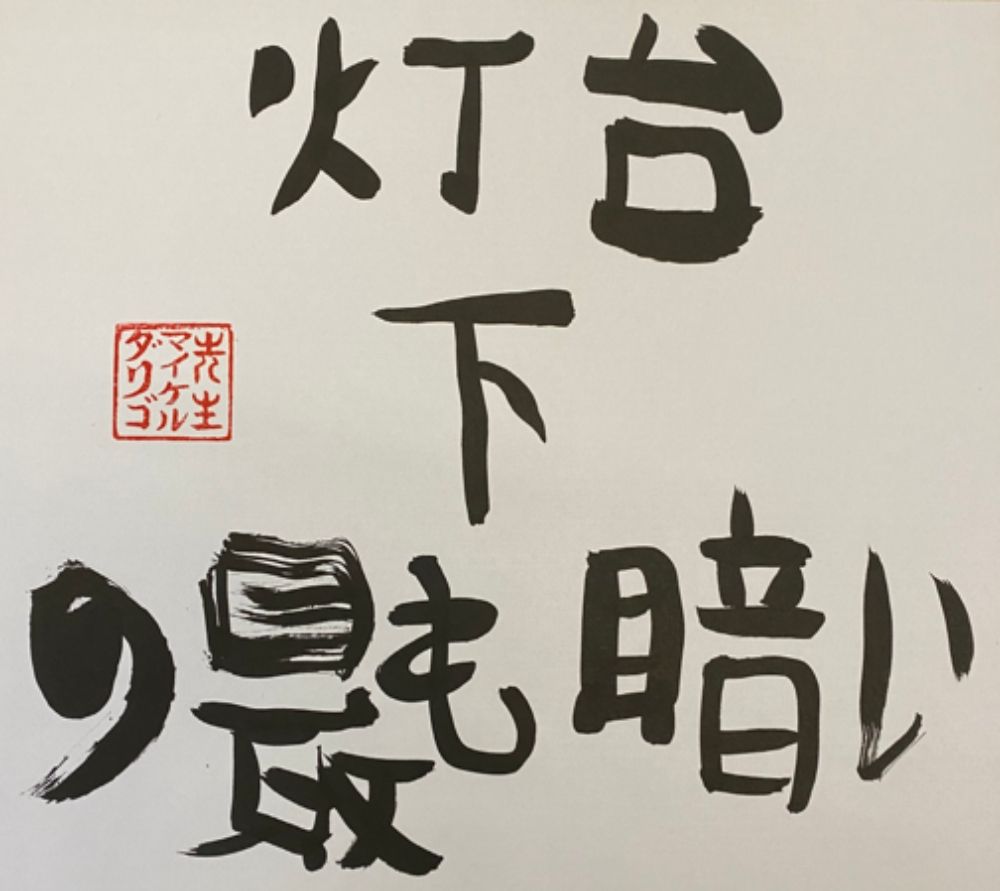Self-reflection is a key to self-improvement but this can be challenging to achieve without the ability to observe ourselves clearly.
Tōdaishita no mottomo kurai 灯台下の最も暗い means “darkest under the lighthouse” in literal terms, but teaches us with its poetic metaphor that even the most keen observers among us many times fail to observe ourselves with the same insight and energy that we use to observe others.
Tōdaishita no mottomo kurai 灯台下の最も暗い is pronounced “toe-dai-sh-tah no moe-toe-moe coo-rye”
The Darkness Around Ourselves
Picture a lighthouse on a nighttime coastline, sending a bright beam out into the darkness all around it, sweeping in all directions as it slowly rotates. The beam it sends can be seen for miles, up and down the coast, and far out to sea, guiding ships safely.
And yet…. There is one place where it is still dark, where the bright beam from the lighthouse doesn’t penetrate, doesn’t illuminate.
That place is directly under and around the lighthouse itself.
Consider this, and now consider that the each of us is our own lighthouse, sending out our beam of understanding and focus all around us – analyzing, commenting, offering advice and perspective. And yet, oftentimes we do not stop to consider ourselves, and our own problems, shortcomings, failures, and yes, even successes and accomplishments.
Many times, we are so focused on “out there” that we do not stop to contemplate “right here” – right inside us, and even all around us.
Effectively, we are in darkness about ourselves, despite our keen abilities to shine light on other people, and problems and issues in the greater world around us.
Shining Light Upon Ourselves
Do we see the faults in others, the shortcomings in the actions of people and organizations in the bigger world, and yet, fail to see the faults and shortcomings in ourselves? Certainly, this isn’t good karatedō.
Are we strong, compassionate, engaged leaders at work, and yet at home, ignore the attention-starved members of our family? To do so is not good karatedō.
Rather, as much as we must serve as the lighthouse for others all around us, we must turn our focused light of attention on us, as well. This is karatedo.
As karateka, we spend hours training to become better in all the different aspects of ourselves, including our skills at observation, problem-solving, empathy, and awareness. We must use those skills close to home, and even in service to ourselves, as much as we use those skills in the greater world around us.
Honesty and Forthrightness for Ourselves
One of the key characteristics of successful people who are good at achieving their goals is this: they are very honest with themselves. Oh yes, they celebrate their achievements! But they also aren’t afraid to note their setbacks, their failures, and their own shortcomings. They are honest about how well their plans are progressing, and they are quick to acknowledge to themselves that it may be time to change plans, alter the course of action, and proceed differently. Does that mean they have to be overly negative with themselves? Certainly not. Harshness with others is an ugly, ill-mannered characteristic unbecoming a karateka: it is equally ugly when applied to oneself.
Positive words of encouragement, given in the context of honesty empathy, does wonders when we work with others. Is it any surprise that it works wonders when we think positively ourselves, and cultivate a strong sense of happiness and pride in our work and in our skills?
Tōdaishita no mottomo kurai 灯台下の最も暗い teaches us to be constantly alert, quick to measure and honest in the analysis of the measurements we take. What are we measuring?
Why, ourselves, of course.
We’re measuring our current state of success, the efficacy of our actions, and the likelihood that we will achieve the objectives we have set out for ourselves.
To fool ourselves is unkind and ultimately dangerous. So much better to be on a constant state of evaluation and analysis, and ready to make changes as needed.
Some might think that doing so would create a constant state of anxiety in our own mind, but this is a naive perspective. Doesn’t it create more anxiety to hide the truth from ourselves? After all, at some level of consciousness we know that we’re doing so.
Rather, we can dispatch anxiety by shining our own light directly on ourselves, but safe also in knowing that we have the ability and opportunity to fix anything that we see which we don’t like.
And remember, in the end, we’re as likely to see all the wonderful things about ourselves that exist as we are to see the things that need fixing or changing.
And that, for its own reward, is a treasure worth having.



![Ikioi — Momentum 勢い [Edition 2025]](https://images.unsplash.com/photo-1691568520168-d74572f43f62?crop=entropy&cs=tinysrgb&fit=max&fm=jpg&ixid=M3wxMTc3M3wwfDF8c2VhcmNofDYyfHxtb21lbnR1bXxlbnwwfHx8fDE3NDczNDY5MDJ8MA&ixlib=rb-4.1.0&q=80&w=720)
![Taikibansei — Great Talent, Evening Forming 大器晩成 [Edition 2025]](https://images.unsplash.com/photo-1534447677768-be436bb09401?crop=entropy&cs=tinysrgb&fit=max&fm=jpg&ixid=M3wxMTc3M3wwfDF8c2VhcmNofDIzfHxzaG9vdGluZyUyMHN0YXJ8ZW58MHx8fHwxNzQ0MTU3MTQzfDA&ixlib=rb-4.0.3&q=80&w=720)
![Gaden Insui — Pull Water to My Own Rice Paddy 我田引水 [Edition 2025]](https://images.unsplash.com/photo-1512117789060-5de1ecef9eb7?crop=entropy&cs=tinysrgb&fit=max&fm=jpg&ixid=M3wxMTc3M3wwfDF8c2VhcmNofDF8fHN0YW5kJTIwdXB8ZW58MHx8fHwxNzQzMzYwMTAzfDA&ixlib=rb-4.0.3&q=80&w=720)